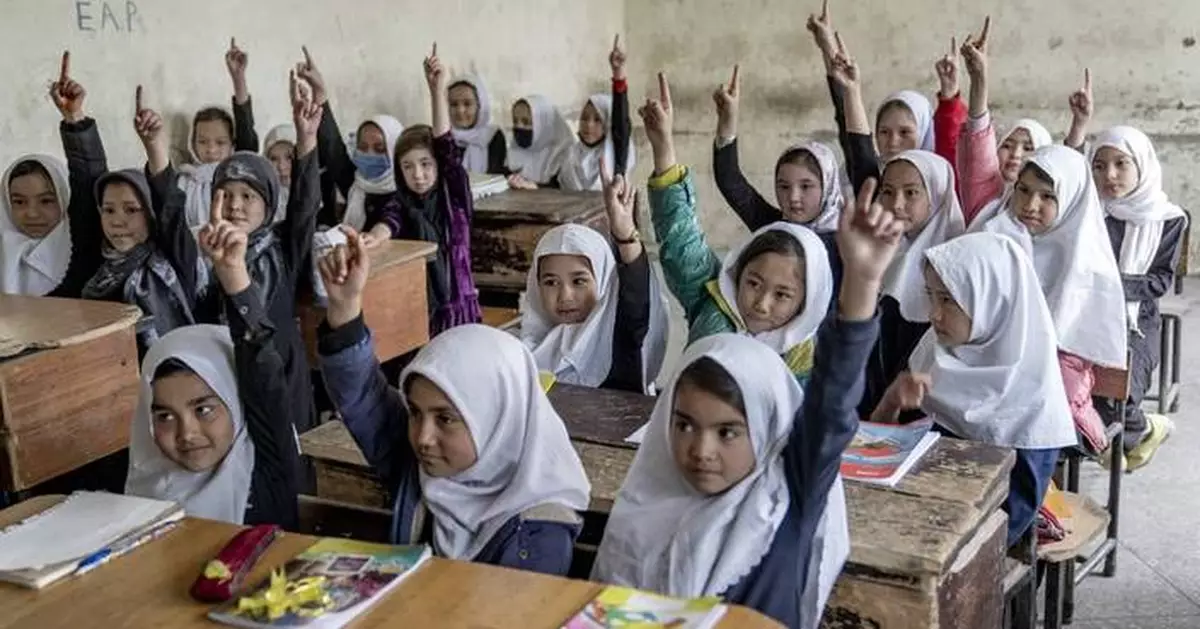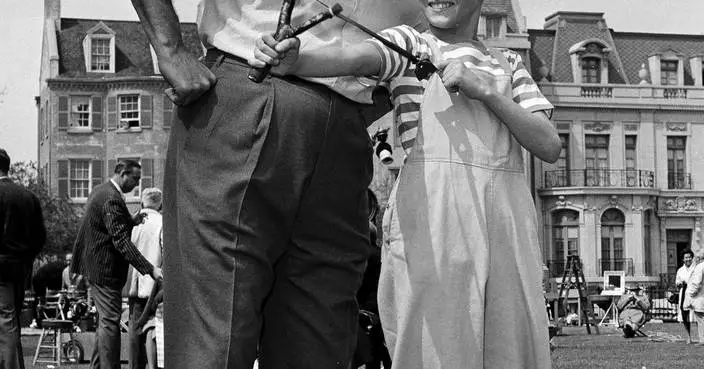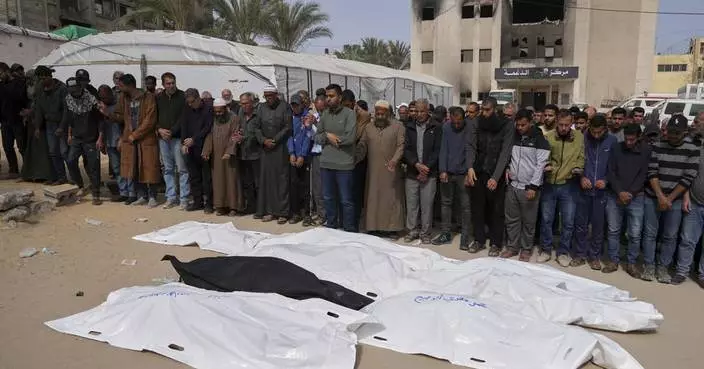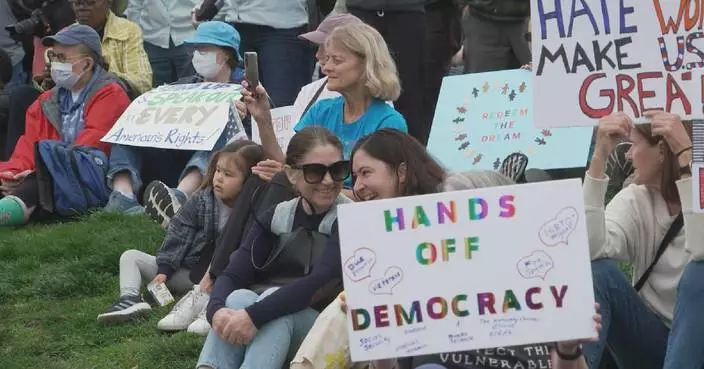KABUL, Afghanistan (AP) — The Taliban have deliberately deprived 1.4 million Afghan girls of schooling through bans, a United Nations agency said Thursday. Afghanistan is the only country in the world that bans female secondary and higher education.
The Taliban, who took power in 2021, barred education for girls above sixth grade because they said it didn’t comply with their interpretation of Sharia, or Islamic law. They didn’t stop it for boys and show no sign of taking the steps needed to reopen classrooms and campuses for girls and women.
UNESCO said at least 1.4 million girls have been deliberately denied access to secondary education since the takeover, an increase of 300,000 since its previous count in April 2023, with more girls reaching the age limit of 12 every year.
“If we add the girls who were already out of school before the bans were introduced, there are now almost 2.5 million girls in the country deprived of their right to education, representing 80% of Afghan school-age girls,” UNESCO said.
The Taliban did not respond to requests for comment.
Access to primary education has also fallen since the Taliban took power in Aug. 2021, with 1.1 million fewer girls and boys attending school, according to UNESCO data.
The U.N. agency warned that authorities have “almost wiped out” two decades of steady progress for education in Afghanistan. “ The future of an entire generation is now in jeopardy,” it added.
It said Afghanistan had 5.7 million girls and boys in primary school in 2022, compared with 6.8 million in 2019. The enrollment drop was the result of the Taliban decision to bar female teachers from teaching boys, UNESCO said, but could also be explained by a lack of parental incentive to send their children to school in an increasingly tough economic environment.
“UNESCO is alarmed by the harmful consequences of this increasingly massive drop-out rate, which could lead to a rise in child labor and early marriage,” it said.
The Taliban celebrated three years of rule Wednesday at Bagram Air Base, but there was no mention of the country’s hardships, nor promises to help the struggling population.
Decades of conflict and instability have left millions of Afghans on the brink of hunger and starvation and unemployment is high.
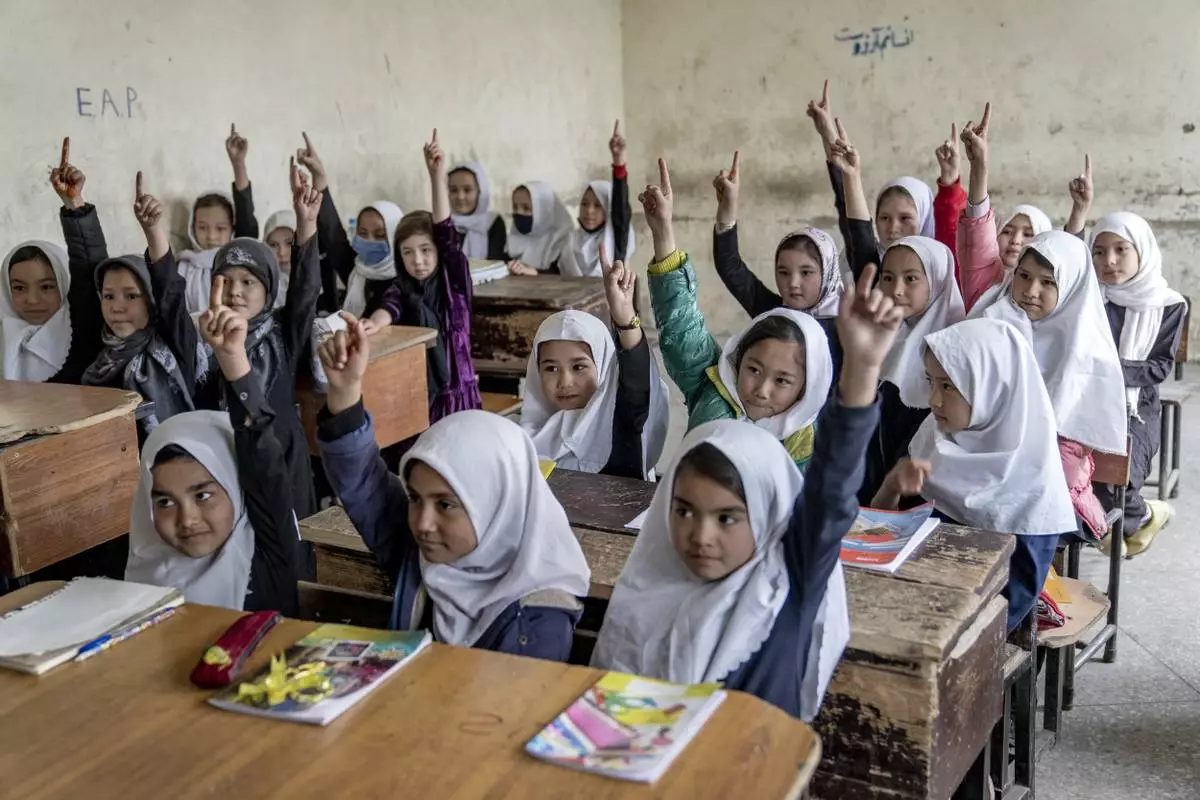
FILE - Afghan school girls attend their classroom on the first day of the new school year, in Kabul, Saturday, March 25, 2023. (AP Photo/Ebrahim Noroozi, File)
OKLAHOMA CITY (AP) — Luka Doncic scored 30 points and the Los Angeles Lakers routed the league-leading Oklahoma City Thunder 126-99 on Sunday.
Austin Reaves scored 20 points and LeBron James added 19 points and seven assists for the Lakers, who have won four of five.
Shai Gilgeous-Alexander scored 26 points and Jalen Williams added 16 for the Thunder.
Oklahoma City remained two games ahead of the Cleveland Cavaliers in the race for the league's best record with five games to play. But instead of closing in on the top seed and homecourt advantage throughout the playoffs, the Thunder lost consecutive games for just the second time this season.
The teams will meet again Tuesday in Oklahoma City.
The Lakers led 42-32 after one quarter.
Doncic drove to the hoop before firing a two-handed pass behind his head to an open Gabe Vincent, who drained the 3-pointer to give the Lakers a 64-42 lead. The Lakers led 78-56 at halftime after making a franchise record 15 3-pointers in the first half. It was the most points Oklahoma City has given up in any half this season. Doncic led the way with 22 points and hit five 3-pointers, with most being well contested.
Doncic was fouled as he made a circus layup and the free throw pushed the Lakers’ lead to 93-67 in the third. The Lakers led 103-77 at the end of the period.
James' son, Bronny, hit a 3-pointer for the Lakers in the final minute to close out the scoring.
Lakers: Los Angeles showed the peak of its capability in perhaps the best piece of evidence that things are working with James and Doncic together.
Thunder: The Lakers' spectacular individual shotmaking rendered Oklahoma City’s team defensive strategy useless.
James got a steal and breakaway dunk in the fourth quarter to make it 107-83.
The Thunder scored fewer than 100 points for the first time since Nov. 15.
AP NBA: https://apnews.com/hub/nba

Los Angeles Lakers guard Austin Reaves (15) looks to shoot over Oklahoma City Thunder center Isaiah Hartenstein, left, during the first half of an NBA basketball game Sunday, April 6, 2025, in Oklahoma City. (AP Photo/Nate Billings)

Oklahoma City Thunder guard Shai Gilgeous-Alexander (2) looks for an outlet against Los Angeles Lakers guard Austin Reaves (15) during the first half of an NBA basketball game Sunday, April 6, 2025, in Oklahoma City. (AP Photo/Nate Billings)

Los Angeles Lakers forward LeBron James warms up before an NBA basketball game against the Oklahoma City Thunder, Sunday, April 6, 2025, in Oklahoma City. (AP Photo/Nate Billings)

Los Angeles Lakers forward LeBron James, right, looks to score in front of Oklahoma City Thunder guard Alex Caruso, center, and forward Chet Holmgren (7) during the first half of an NBA basketball game Sunday, April 6, 2025, in Oklahoma City. (AP Photo/Nate Billings)

Los Angeles Lakers guard Luka Doncic (77) looks to pass the ball away from Oklahoma City Thunder center Isaiah Hartenstein, left, during the first half of an NBA basketball game Sunday, April 6, 2025, in Oklahoma City. (AP Photo/Nate Billings)

Oklahoma City Thunder guard Shai Gilgeous-Alexander, left, dribbles away from Los Angeles Lakers guard Luka Doncic, right, during the first half of an NBA basketball game Sunday, April 6, 2025, in Oklahoma City. (AP Photo/Nate Billings)

Los Angeles Lakers guard Luka Doncic (77) looks to shoot over Oklahoma City Thunder guard Alex Caruso (9) during the first half of an NBA basketball game Sunday, April 6, 2025, in Oklahoma City. (AP Photo/Nate Billings)



